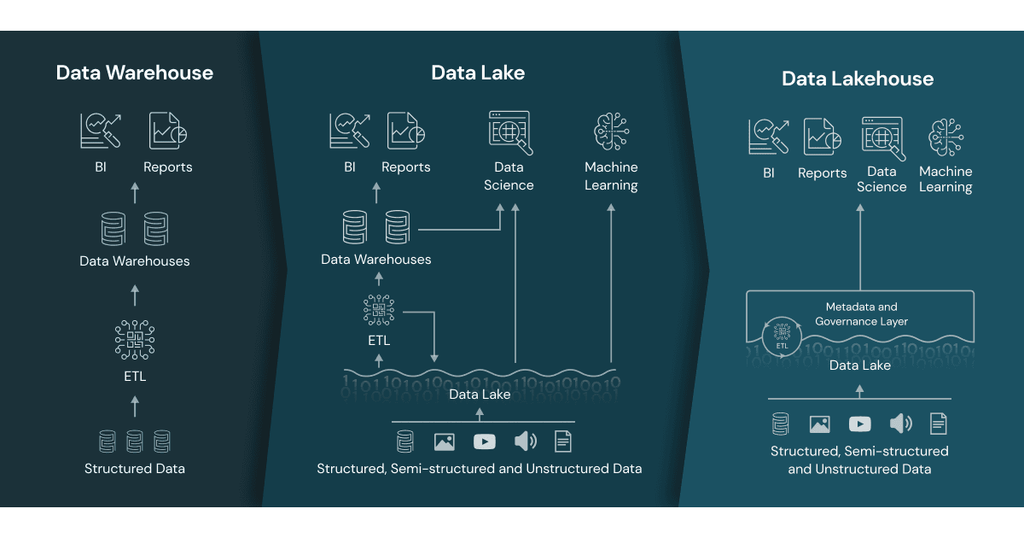As a data engineer, we often hear terms like Data Lake, Delta Lake, Data Lakehouse, and data warehouse, which might be confusing at times. Today, we’ll explain these terms and talk about the differences of each of the technologies and concepts, along with scenarios of usage for each.
Delta Lake
Delta lake is an open-source technology, we don’t have a Delta Lake; you use Delta Lake to store your data in Delta tables. Delta lake improves data storage by supporting ACID transactions, high-performance query optimizations, schema evolution, data versioning and many other features.
Delta Lake takes your existing Parquet data lake and makes it more reliable and performant by:
- Storing all the metadata in a separate transaction log
- Tracking all the changes to your data in this transaction log
- Organizing your data for maximum query performance
Data Lakehouse
Data lakehouse is a new, open data management architecture that combines the flexibility, cost-efficiency, and scale of data lakes with the data management and ACID transactions of data warehouses, enabling business intelligence (BI) and machine learning (ML) on all data.
Data Lake
A data lake is a centralized repository that allows organizations to store vast amounts of structured, semi-structured, and unstructured data. Unlike traditional data warehouses, a data lake retains data in its raw form until it is needed, which provides flexibility in how the data can be used.
Data Warehouse
A data warehouse is a centralized repository that stores structured data (database tables, Excel sheets) and semi-structured data (XML files, webpages) Its data is usually cleaned and standardized for the purposes of reporting and analysis.

Data lakes vs. data lakehouse vs. data warehouses
follow table simply compared what difference .
| Data lake | Data lakehouse | Data warehouse | |
| Types of data | All types: Structured data, semi-structured data, unstructured (raw) data | All types: Structured data, semi-structured data, unstructured (raw) data | Structured data only |
| Cost | $ | $ | $$$ |
| Format | Open format | Open format | Closed, proprietary format |
| Scalability | Scales to hold any amount of data at low cost, regardless of type | Scales to hold any amount of data at low cost, regardless of type | Scaling up becomes exponentially more expensive due to vendor costs |
| Intended users | Limited: Data scientists | Unified: Data analysts, data scientists, machine learning engineers | Limited: Data analysts |
| Reliability | Low quality, data swamp | High quality, reliable data | High quality, reliable data |
| Ease of use | Difficult: Exploring large amounts of raw data can be difficult without tools to organize and catalog the data | Simple: Provides simplicity and structure of a data warehouse with the broader use cases of a data lake | Simple: Structure of a data warehouse enables users to quickly and easily access data for reporting and analytics |
| Performance | Poor | High | High |
summary
Data lakes are a good technology that give you flexible and low-cost data storage. Data lakes can be a great choice for you if:
- You have data in multiple formats coming from multiple sources
- You want to use this data in many different downstream tasks, e.g. analytics, data science, machine learning, etc.
- You want flexibility to run many different kinds of queries on your data and do not want to define the questions you want to ask your data in advance
- You don’t want to be locked into a vendor-specific proprietary table format
Data lakes can also get messy because they do not provide reliability guarantees. Data lakes are also not always optimized to give you the fastest query performance.
Delta Lake is almost always more reliable, faster and more developer-friendly than a regular data lake. Delta lake can be a great choice for you because:
- You have data in multiple formats coming from multiple sources
- You want to use this data in many different downstream tasks, e.g. analytics, data science, machine learning, etc.
- You want flexibility to run many different kinds of queries on your data and do not want to define the questions you want to ask your data in advance
- You don’t want to be locked into a vendor-specific proprietary table format
Please do not hesitate to contact me if you have any questions at William . chen @mainri.ca
(remove all space from the email account 😊)

